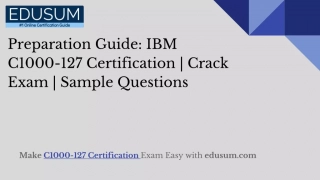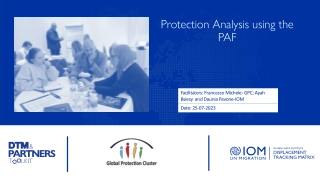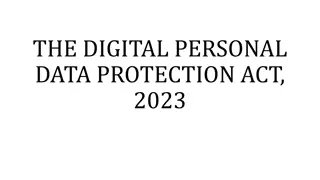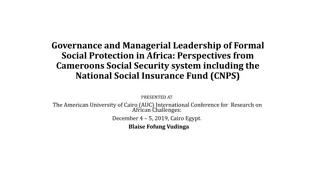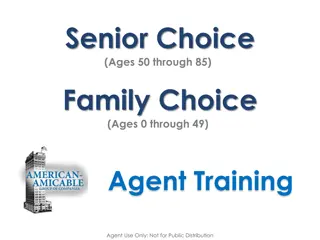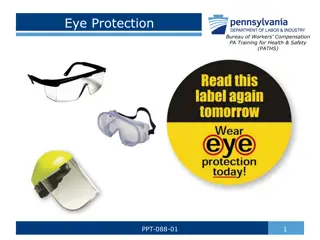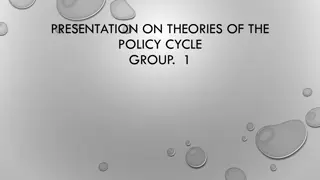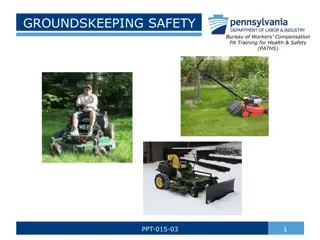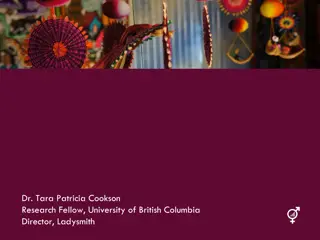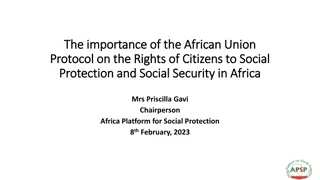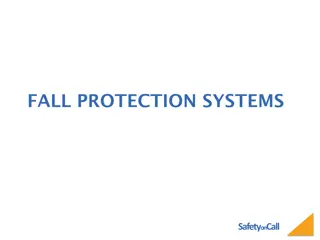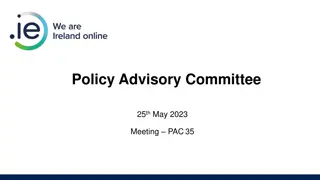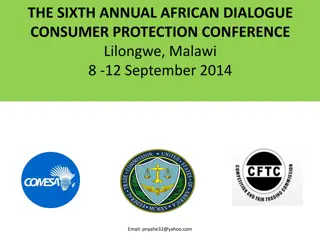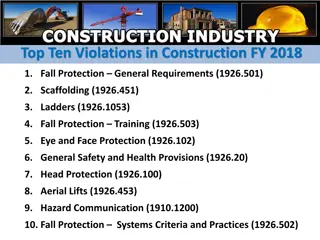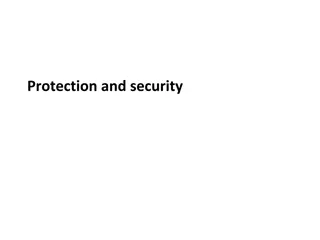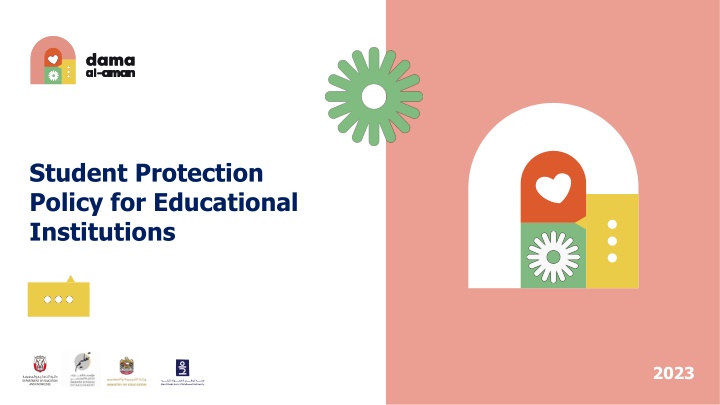
Student Protection Policy 2023 for Educational Institutions in Abu Dhabi
"Ensure student protection in Abu Dhabi educational institutions with this policy. Includes measures to prevent harm, support at-risk students, and define roles and responsibilities. Mandates reporting of maltreatment and emphasizes coordination for student care and safety."
Download Presentation

Please find below an Image/Link to download the presentation.
The content on the website is provided AS IS for your information and personal use only. It may not be sold, licensed, or shared on other websites without obtaining consent from the author. If you encounter any issues during the download, it is possible that the publisher has removed the file from their server.
You are allowed to download the files provided on this website for personal or commercial use, subject to the condition that they are used lawfully. All files are the property of their respective owners.
The content on the website is provided AS IS for your information and personal use only. It may not be sold, licensed, or shared on other websites without obtaining consent from the author.
E N D
Presentation Transcript
Student Protection Policy for Educational Institutions 2023
PURPOSE SCOPE The purpose of this policy is to ensure that all educational departments and educational institutions in Abu Dhabi have student protection measures in place to: This policy is relevant for all educational institutions in the Emirate of Abu Dhabi, including nurseries, KGs, public, private and charter schools. Protect students under the supervision of educational institutions from all acts and omissions constituting maltreatment. Identify and support students who are at risk of harm, as enforced by UAE Federal Law No. (3) of 2016 Concerning Child Rights, Federal Law No. (31) of 2021 Promulgating the Crimes and Penalties Law, Federal Law No. (5) of 1983 Concerning Nurseries, Federal Law No. (18) of 2020 Concerning Private Education, Executive Council Chairman Decision No. (26) of 2013 Regarding the Regulation of Private Schools in the Emirate of Abu Dhabi, and other relevant UAE laws. Emphasize that all staff and volunteers of educational departments and educational institutions are mandated reporters of cases of alleged and/or suspected maltreatment of students inside and outside the educational institution. Define roles and responsibilities of principals, staff and parents/ legal guardians of students in educational institutions for responding to alleged and/or suspected cases of maltreatment of students. Ensure that all educational institutions are responsible for the care and protection of all students in educational institutions and coordinate actions to safeguard them.
ACRONYMS MoE: UAE Ministry of Education ADEK: Abu Dhabi Department of Education & Knowledge MoI-CPC: Ministry of Interior Child Protection Center CPS: Child Protection Specialist CPT: Child Protection Team CPC: Child Protection Coordinator CPU: Child Protection Unit FCA: Family Care Authority
DEFINITIONS the custodian of the child as per the Federal Decree Law No. 3 of 2016 Concerning Child Rights. (Wadeema s Law). Staff Staff is an individual employed by a school or nursery on a remunerated contractual basis regardless of employment mode (internal, external/third-party, etc.). A school day is the institution s operating hours including time spent by the student in school buses to and from the school and in extra-curricular school activities. A student under this policy is a national or a resident who is enrolled in an educational institution in Abu Dhabi. Safeguarding Safeguarding is protecting students from all risk of harm, including maltreatment and other types of risks that impact their overall health and development, wellbeing, and safety. Student maltreatment, for the purpose of this policy, is synonymous to child maltreatment, which refers to abuse (physical, emotional, and sexual), and includes neglect, exploitation, bullying, and cyberbullying of a student. Student protection, for the purpose of this policy, is synonymous to child protection, which is defined as all measures, steps and actions that must be taken to prevent, protect and support students from risks that may cause harm or injury whilst they are under the supervision of the educational institution. Supervision Supervision is the state of being responsible, having the duty of care, and keeping watch over an individual in the interest of their and others security while utilizing its systems and taking part in all activities organized by the school, inside or outside its premises, including travelling to and from the school using its transportation, and moving between and waiting for activities. An invited visitor invited visitor is an individual visiting the educational institution on a temporary basis to interact with students (e.g., a speaker, career fair representative, etc.). Volunteer: Volunteer: An individual engaged by an educational institution on a non-remunerated basis to interact with students (e.g., parent chaperones, etc.). A Child is any resident of the UAE under 18 years of age. A Child Protection Coordinator (CPC) is an appointed staff member at the educational institution who is professionally trained and equipped with skills to act upon child protection concerns that arise within their institution and is the key contact for staff and authorities where a concern is identified within the institution. They should also be the point of contact for the institution to respond to emergencies, report to the CPU and other authorities involved, liaise with parents, and provide ongoing support to the child. A Child Protection Unit (CPU) is an organizational unit at MoE, ESE and ADEK whose purpose is to develop and implement student protection mechanisms and measures for educational institutions in the Emirate of Abu Dhabi, in line with Federal Law No. (3) of 2016 Concerning Child Rights and bylaws. The CPU is responsible for receiving and assessing concerns related to maltreatment of students, in line with the procedures detailed in this document. A Child Protection Specialist (CPS) is the person authorized and charged by MoE, ESE, ADEK, and the Abu Dhabi Judicial Department and the Ministry of Community Development to preserve the rights of the child and protect him within the limits of his powers, in accordance with Federal Law No. (3) of 2016 Concerning Child Rights and bylaws. An educational institution is any learning, care and/or educational entity, including KGs, public schools, nurseries and private/charter schools, that is under the purview of the MoE, ESE and/or ADEK. A mandated reporter is a person who is required by law (under Article 42 of Federal Law No. 3) to report student concerns of maltreatment related to students to the Child Protection Specialist. This includes FCA, the educators in educational institutions or any adult on institution premises or outside the institution premises from which the student requests assistance in notifying the authorities (e.g., the Police, MoI-CPC, MoE, ESE and ADEK) about his/her suffering or any other student s suffering. Parent Parent is the person legally liable for a child or entrusted with their care, defined as
TYPES OF MALTREATMENT OF STUDENTS Physical abuse: An intentional physical act or failure or unwillingness to act which results in, has a high likelihood of resulting in, or poses a threat of resulting in, immediate and/or long-term physical injury or harm to students health, survival and development. Emotional abuse: An act, whether consistent or inconsistent, used to make a student feel unloved, worthless, and of no value and integrity, interfering with the student s positive mental and emotional development. Sexual abuse: The coercion, attraction or involvement of students in sexual activity that they may or may not fully comprehend, or that violates the laws or social taboos of society. Activity could also include practices that do not involve any physical contact, such as involving students in watching or producing pornographic material, or watching sexual practices, or encouraging students to behave in inappropriate sexual ways. Student sexual abuse is evidenced by the activity between an adult and a student, or between students, who by age or development is in a relationship of responsibility, trust or power. The intent of the activity is to gratify or satisfy the needs of the other person.. Neglect: Failure of parents or caregivers to provide for/protect the basic needs and rights of students to safeguard their life, physical safety, development, and psychological, mental, and moral integrity and wellbeing, that may lead to a failure to thrive in the context of the resources reasonably available to the family and/or caregiver and causes or has a high probability of causing significant harm to students health and/or physical, social, educational, mental, spiritual or moral integrity. Exploitation: Use of students in work or other activities for the benefit of others. This includes, but is not limited to, student labor and exploitation of students in prostitution or involvement of students in gangs, militia or military. These activities are to the detriment of students physical or mental health, education, and moral or social development Sexual exploitation is a form of sexual abuse where there is abuse of power by a youth, adult or group who may coerce, manipulate or deceive a student into sexual activity by physical contact and/or use of technology for monetary, social or political gain. Economic exploitation is the use of a student who is below the minimum labor age in the workplace or related activities for the benefit of others through the production, distribution and consumption of goods or of a particular service delivered by the student. The guide on handling maltreatment of students at educational institutions provides a full list of signs for identifying all types of maltreatment.1 Bullying is the repeated physical, psychological, social or verbal aggression exercised by students who feel they are in a position of power against peers who are perceived weaker or powerless, to achieve specific gains or draw attention, in a way that hurts students physically and/or emotionally; bullying can be committed by groups or individuals, in online (cyberbullying) or offline settings. Cyberbullying: Bullying that takes place online. Online bullying can follow the bullied student wherever they go via social networks and mobile phones and has a wider reach than bullying in the real world. The guide on Handling Student Maltreatment Concerns within Educational Institutions1provides a full list of signs for identifying all types of maltreatment. The National Policy for the Prevention of Bullying in Educational Institutions provides a complete framework for bullying and cyberbullying. 1) The guide has been co-developed with the MoE, ESE and ADEK
PRINCIPLES POLICY Best interests and safety of students shall be a primary consideration in all actions taken to safeguard their wellbeing. It is the responsibility of the educational institution, the principal and all staff, to recognize, respond to, and manage student protection risk and impact to the best of their ability. All mandated reporters and educational institution staff and volunteers are responsible and accountable for ensuring student protection measures are in place, applied, and upheld. All mandated reporters and educational institution staff and volunteers will be protected and will not be hindered or penalized in any manner for carrying out their responsibilities to report and safeguard students from all forms of maltreatment. All students have the right to be: a. Heard and to express their voice/opinion and participate in select decision- making processes in the educational institution (to be determined by institution staff). b. Treated with dignity and respect. c. Treated with fairness and justice. d. Supported by an advocate and provided with necessary support when required. e. Safe, protected from harm and aware of what constitutes risk and harm. Zero tolerance of all forms of maltreatment is to be implemented and upheld in all actions and environments pertaining to students. 1. Legal obligations and rights: This policy was developed in line with federal student protection and related regulations and policies.2 All educational institutions shall comply with the provisions of this policy. Every educational institution shall develop and publish a student protection policy to protect students from any maltreatment, provided it meets the minimum standards of what is included in this policy and does not contradict any of its provisions. Institutions may equally adopt the current policy as their own and publish it on their website. All educational institutions shall comply with the Handling Student Maltreatment Concerns within Educational Institutions guide to manage abuse-related offenses that are reported and/or occurring in an educational institution. Educational institutions shall ensure that the student protection policy has been communicated, understood and agreed to by all institution stakeholders (board members, staff and volunteers, parents, and students). Students shall receive a student-friendly version of the student protection policy and their assent should be obtained when any student protection concerns are raised. The educational institution and its principal are guardians of the rights of students to not be exposed to maltreatment in the educational environment. The principal acts as the guardian of all students while they are under the educational institution supervision and shall take responsibilities that fall under this role. All students have equal rights to care, protection and safety in all educational institutions. Educational institutions are fully responsible for the care, protection and safety of students while students are under the institution supervision. 2) Policies are detailed in the References section at the end of this document
POLICY (continued) All educational institutions shall appoint a Child Protection Coordinator (CPC) and a Child Protection Team (CPT). The team would typically include 3-5 members consisting of the counselor and/or social worker as well as relevant members of the senior leadership team, any of whom may or may not take on the role of the CPC. In educational institutions where such a team cannot be formed, the CPC would be responsible for case management within the educational institution, and a delegate should always be nominated in case the CPC is unavailable/unable to perform their duties. If any staff of the educational institution, including volunteers, receives an allegation or has a concern that a student may have been maltreated, is being maltreated, or is at risk of maltreatment as defined in the Types of Maltreatment of Students section, they shall report the matter to the CPC or any other person representing him/her immediately. This includes concerns of maltreatment taking place inside or outside of the educational institution s premises. In case the reporter is unable to reach the CPC, or any other person representing him/her, or that it is not in the best interest of the student to inform the CPC, then the reporter could inform the relevant CPUs at the ESE, ADEK and/or the FCA directly by filling the Safety Concern Form online in the digital safety concern portal. The CPC should, in emergency cases where a student is in imminent danger, report the situation without delay to the Police (999) and School Principal, while filling the Safety Concern Form online on the digital safety concern portal. Emergency cases are detailed in the Handling Student Maltreatment Concerns within Educational Institutions guide. 2. Reporting of concerns of maltreatment at educational institutions: Staff of educational institutions, including any person who, in the performance of their duties, has regular or temporary contact with students and who provides services to students or to the institution, are mandated by Federal Law No. 3 of 2016 on Children s Rights to report all cases of alleged and/or suspected maltreatment (conducted by any alleged/suspected perpetrator inside or outside of the educational institution) directly to the department- appointed Child Protection Specialist (CPS) and/or Child Protection Unit (CPU) within 24 hours upon suspicion. Staff should follow the procedures outlined in Figure 1. Safety Concern Referrals in Abu Dhabi Educational Institutions and guide on the Handling Student Maltreatment Concerns within Educational Institutions. All concerns of student maltreatment disclosed in educational institutions, whether the maltreatment took place inside or outside of the institution, should be notified to the CPC or any other person representing him/her. The MoE has put in place the National Policy for the Prevention of Bullying in Educational Institutions for handling bullying cases. Therefore, all cases of bullying should be handled in accordance with the procedures defined in that framework. Exceptions to bullying cases include severe bullying (cases of bullying that have or risk having a significant physical and emotional impact on the student, would be considered as maltreatment), which should be handled according to the procedures defined in this policy. This is also in line with the MoE Child Protection in Educational Institutions Policy. This policy will replace the ADEK Child Protection Policy (2016) and the ADEK Private Schools and Policy Guide Manual.2 2) Policies are detailed in the References section at the end of this document
POLICY (continued) How should concerns of maltreatment identified in or disclosed at educational institutions be handled? Once a concern of maltreatment (incl. severe bullying) of a student has been raised at an educational institution, this should be reported directly to the CPC, or any other person representing him/her in the institution (all staff in the educational institution should be trained on identifying maltreatment of students, in line with the operational definitions of the different types of maltreatment included in this policy). It is important to note that the relevant CPU reserves the right to designate a qualified institution personnel to conduct the initial safety and risk assessment before referring the concern to the FCA. If the relevant CPU refers the concern to the FCA, the concern would then be actioned by the CPS at the FCA. The relevant CPU should still provide administrative support (e.g., sharing relevant information) to enable the FCA to conduct the needed assessments and other case management activities. Emergency concerns, where the student is in imminent danger, should be reported immediately to the Police (as outlined in this policy). For concerns of maltreatment which occurred outside of the supervision of the institution, the staff should inform the CPC or any other person representing him/her if the CPC is not present. The CPC should then complete the Safety Concern Form online on the digital safety concern portal. Once submitted, a copy of the Safety Concern Form will then be automatically shared with the FCA, the relevant CPU in educational institution (ESE CPU or ADEK CPU), and MoI CPC. FCA would review the case and take necessary procedures for case management. For concerns of maltreatment which occurred under the supervision of the educational institution, the staff should inform the CPC or any other person representing him/her if CPC is not present. The CPC should then complete the Safety Concern Form online on the digital safety concern portal. Once submitted, a copy of the Safety Concern Form will then be automatically shared with the FCA, the relevant CPU in educational institution (ESE CPU or ADEK CPU), and MoI CPC.The Child Protection Unit within the relevant educational institution will review the information first before referring to the FCA for case management, who will take the necessary procedures to follow-up on the cases after receiving the report If the relevant CPU does not refer the case to the FCA, the concern is returned to the educational institution with reasons, and the educational institution is asked to collect additional information before submitting another Safety Concern Form. In all situations, the relevant CPU would ensure that the concern gets logged and responded to.
POLICY (continued) 3. Data confidentiality: Case reports and student data are strictly confidential. The identity of the student subject to alleged and/or suspected maltreatment, the alleged/suspected perpetrator and the person reporting the alleged/suspected case must be kept confidential by all parties involved in the case. This visual summarizes how concerns of maltreatment should be handled in cases where the alleged maltreatment occurred both inside and outside of the supervision of the educational institution. Figure 1. Safety Concern Referrals in Abu Dhabi Educational Institutions Figure 1. Safety Concern Referrals in Abu Dhabi Educational Institutions The data should be shared only with authorized individuals from the relevant CPU and the FCA, investigative teams and the Abu Dhabi Judicial Department. Authorized individuals are strictly prohibited from discussing active and/or closed cases with the media, any third parties or other staff, and/or unauthorized departmental staff, with the exception of investigative and judicial authorities as part of their legal responsibilities. 4. Training Given the critical importance of understanding and complying with all aspects of this policy to ensure the protection of students, educational departments shall conduct and/or coordinate with relevant agencies the delivery of student protection training for leaders and other specified staff in educational institutions for which attendance is mandatory. All staff in schools and nurseries shall complete the student protection policy and safeguarding training sessions and sign off that they have received training and understand their responsibilities. Relevant contact details are as follows: Abu Dhabi Police: 999 Abu Dhabi Police: 999 Ministry of Education Child Protection Unit: Ministry of Education Child Protection Unit: 80085; cpu@moe.gov.ae (for guidance) Emirates Schools Establishment Child Protection Unit: Emirates Schools Establishment Child Protection Unit: cpu@ese.gov.ae Family Care Authority Family Care Authority: 800444; ICM@adfca.gov.ae Safety Concern Portal: Safety Concern Portal: www.daasafetyconcern.abudhabi Volunteers shall receive proper induction and training on student protection policy and safeguarding measures. All invited visitors shall also be required to attest to having read and understood the school s student protection policy. Any staff providing counseling, support, advocacy or being in close personal contact with students shall receive continuous training in student protection and safeguarding and be properly supervised by the principal. CPSs working in CPUs shall receive the Ministry of Community Development certification.
POLICY (continued) 5. Vetting, Hiring and Monitoring of Educational Institution Staff and Volunteers: 7. Student Protection Learning Resources: Age-appropriate student protection learning resources shall be developed and distributed to students to support their knowledge and ability to understand personal safety and wellbeing and what actions they can take to report any violations and seek help. Age-appropriate student protection learning resources shall be taught in the classroom and in counseling sessions and include story books, activity books, illustrations, posters, reading content, etc., that can be discussed either individually or within a group setting. Student protection shall be taught by trained staff who are skilled in understanding student protection and student development. All content shall identify easy-to-use references on where to seek assistance if needed. Staff, volunteers and invited visitors shall be properly vetted and screened prior to working in or accessing any locations where students are present. This includes criminal record checks from countries from which the applicant is being hired. The principal must take full responsibility and accountability for all persons working in educational institutions and ensure their suitability and compliance with all student protection and safeguarding requirements. This includes preventing any person from working with students if they pose a risk to students safety and wellbeing. The principal must ensure continuous monitoring of all staff and immediately report alleged inappropriate conduct or suspected actions that may result in harm or risk of harm to a student. 8. Non-Compliance: Failure to comply with this policy is subject to legal accountability and administrative penalties stipulated in accordance with the UAE Federal Law No. 3 of 2016 on Children s Rights, Federal Law No. 3 of 1987 on the Penal Code and any other local or federal relevant laws effective at the time of the incident. 6. Acceptable Adult Behaviors: Staff and volunteers and visitors shall respect and protect the rights of all students and take no action that may put students at risk of maltreatment. Staff and volunteers and visitors shall not undertake any inappropriate behaviors towards students and/or in the presence of students. Staff and volunteers and visitors are required to report any incidents of inappropriate behaviors against students. Serious allegations of sexual misconduct by staff and volunteers and visitors will be directly reported to the Police and FCA and the concerned staff/volunteer/visitor will be immediately removed from the educational institution s premises.
POLICY (continued) 9. Policy Dissemination and Review The student protection policy shall be available publicly and on the educational institution s website and distributed, together with a student-friendly version, annually to parents, institution board members, staff and volunteers. All student protection policies, guidelines, safeguarding measures and procedures should be regularly reviewed and updated at least every 5 years or as required.
ROLES AND RESPONSIBILITIES Ministry of Education (MoE): Emirates School Establishment (ESE): Develop, monitor, and enforce student protection policies and safeguarding measures. Introduce student protection standards to the inspection framework, monitor and work with educational institutions falling below expectations by providing the necessary support. Collaborate with relevant entities on the design and implementation of safeguarding programs Provide guidance to reporters and redirect them to safety concern portal if they are reporting a child maltreatment concern Develop, monitor, and enforce student protection policies and safeguarding measures. Support educational institutions in developing their student protection policies where needed. Introduce a broad range of student protection standards to the inspection framework, monitor and work with educational institutions falling below expectations by providing the necessary support. Collaborate with relevant entities on the design and implementation of safeguarding programs Receive and filter reports of concern of maltreatment of students (neglect, physical and emotional abuse) and notifications (sexual abuse and exploitation) occurring at educational institutions and take necessary actions. Refer concerns to the relevant entities of any suspicion of maltreatment of a staff member of an educational institution towards a student. Allocate cases to the relevant child protection specialist for initial assessment Activate bullying procedures in line with relevant entities. Follow up with the Child Protection Specialists on the cases that are being handled within public schools and KGs Cooperate with and facilitate education-related information sharing for comprehensive assessments and/or investigations (in the best interests of the student and in line with the legal framework) of maltreatment of students Follow up with the FCA on the case management status for cases referred to the FCA Document all notifications and/or reports received in confidential records that can be accessed only by Child Protection Specialists or any other concerned agency, where needed, based on information sharing protocols Participate in Family and Child Protection Committee meetings to provide support in complex cases Ensure the adoption of safeguarding practices and measures in schools (incl. school transportation such as buses and travel for extracurricular activities) Oversee and monitor the case management of the child protection specialists at the agency
ROLES AND RESPONSIBILITIES Abu Dhabi Department of Education and Knowledge (ADEK): Develop, monitor, and enforce student protection policies and safeguarding measures. Support educational institutions in developing their student protection policies where needed. Introduce a broad range of student protection standards to the inspection framework, monitor and work with educational institutions falling below expectations by providing the necessary support. Collaborate with relevant entities on the design and implementation of safeguarding programs Receive and filter reports of concern of maltreatment of students (neglect, physical and emotional abuse) and notifications (sexual abuse and exploitation) occurring at educational institutions and take necessary actions. Refer concerns to the relevant entities of any suspicion of maltreatment of a staff member of an educational institution towards a student. Activate bullying procedures in line with relevant entities. Cooperate with, and facilitate, the sharing of education-related information for comprehensive assessments and/or investigations of maltreatment of students being conducted by the relevant entities. Follow up, if needed, with the relevant entities on the referrals made to them for cases in education institutions. Document all notifications and/or reports received in confidential records that can be accessed only by the CPS or any other concerned agency(ies), where needed, based on established information sharing protocols.
PRINCIPLES Conduct orientation sessions for parents upon student registration or enrollment and at the start of every school year to promote this policy and to inform them of their roles and responsibilities, and their rights and duties. Maintain student records in compliance with MoE/ADEK policy and ensure confidentiality of open and closed cases in accordance with the guidelines. Immediately suspend any staff member temporarily who is suspected of an offense involving the maltreatment of students until the suspicion is adjudicated. Ensure that students have a safe and confidential opportunity to report any concerns they may have about their rights to safety and wellbeing. Ensure vetting, hiring and monitoring of all staff, volunteers, and invited visitors according to this policy and relevant safeguarding measures. Comply with the provisions of this policy. Every educational institution shall publish and post this policy to protect students from maltreatment. Ensure that procedures to prevent situations that could lead to maltreatment of students are in place and understood by all educational institution staff and principals. Ensure the oversight of students at all times while under the educational institution supervision. Ensure that there is priority emphasis at the educational institution on student protection and for taking immediate action when there is suspicion of cases of maltreatment of students. Ensure that students know how, where, and to whom to safely report their concerns about alleged and/or suspected maltreatment without fear of retribution or punishment. Ensure that staff, volunteers and students are aware of how, where, and to whom, and where they can safely report their concerns about the potential exposure of any student to alleged and/or suspected maltreatment without fear of retribution or punishment. Include the views and recommendations from students and parents on safety and protection reporting at the educational institution. Immediately report any case of alleged and/or suspected maltreatment of students as stated by this policy. Ensure that all staff and volunteers targeted for student protection training fully attend and participate in all training sessions and sign off on safeguarding training and student protection training.
References The United Nation's Convention on the Rights of the Child (UNCRC) 1991 UAE Federal Law No. 3 of 2016 on Children s Rights (Wadeema) Federal Law No. (5) of 1983 Concerning Nurseries Decree related to Federal Law No. (21) of 2021 Federal Law 9 of 1976 (Juvenile Delinquents and Vagrants Act) UAE Penal Cole 1987 UAE Criminal Procedure Code 1992 UAE Law of Evidence 1992 Federal Compulsory Education Law - 11, 1972 MoI Child Protection Center website (www.moi-cpc.gov.ae) MoI-ADEK Child Protection Center Memorandum of Understanding of 2015 MoE Child Protection Policy MoE National Policy for the Prevention of Bullying in Educational Institution ADEK Policy 30 (Professional Code of Ethics) of the Private Schools Policy and Guidance Manual 2014-2015 ADEK Policy 3 (Students Protection) of the Private Schools Policy and Guidance Manual 2014-2015 Handling Student concerns of maltreatment at educational institutions All Staff and Volunteers of Educational Institutions shall: Report an alleged and/or suspected case of maltreatment upon immediate discovery. Always care for students while under the institution supervision. Understand this policy to address alleged and/or suspected cases of maltreatment of students. Attend and participate in mandated student protection and safeguarding training. Parents: Cooperate with the educational institution s principal and staff, answer all inquiries about the student s behavior and academic performance, and respond to their feedback and guidance. Attend all scheduled parent meetings with the educational institution. Communicate any concerns, observations, or changes in their student s behavior to the educational institution s principal, board members, and/or to the concerned institution s staff. Support the educational institution in ensuring safe online practices during distance learning and homework. Appendix Safety Concern Portal: www.daasafetyconcern.abudhabi
Thank you 2023

